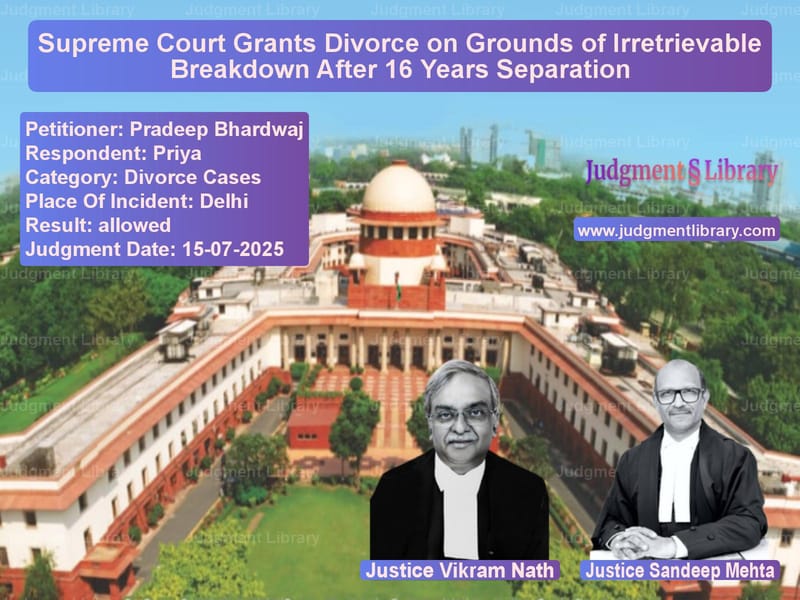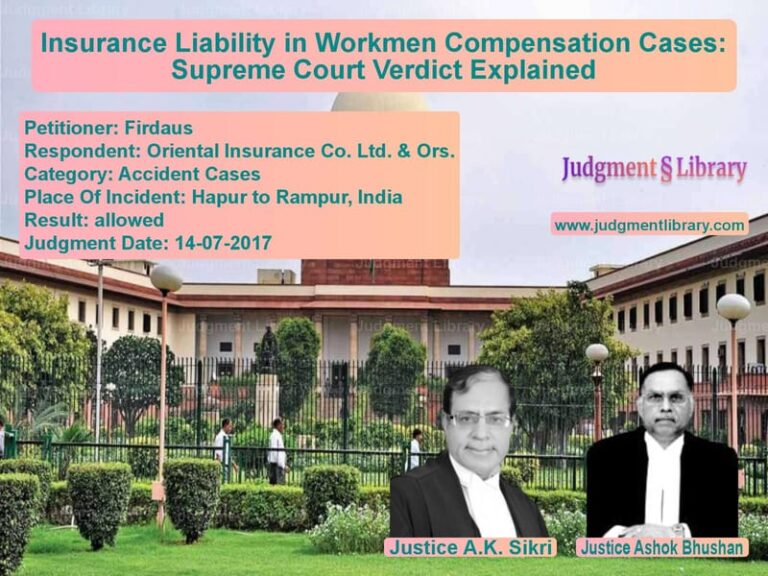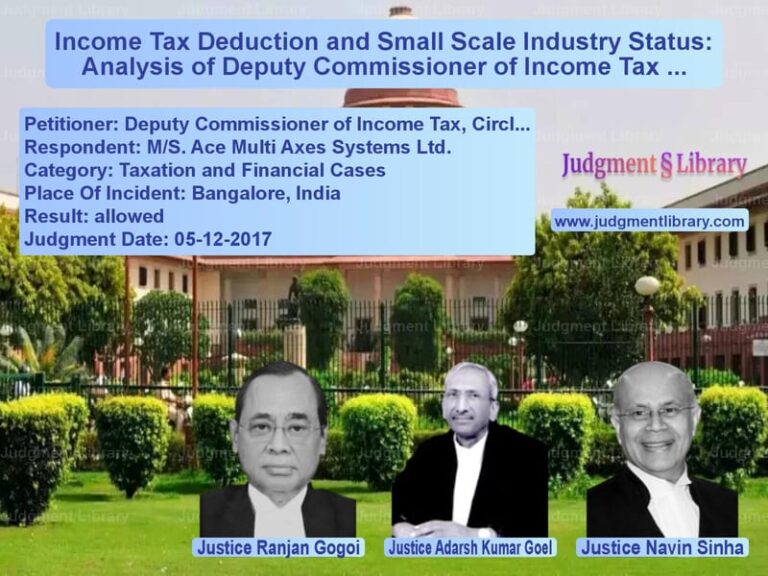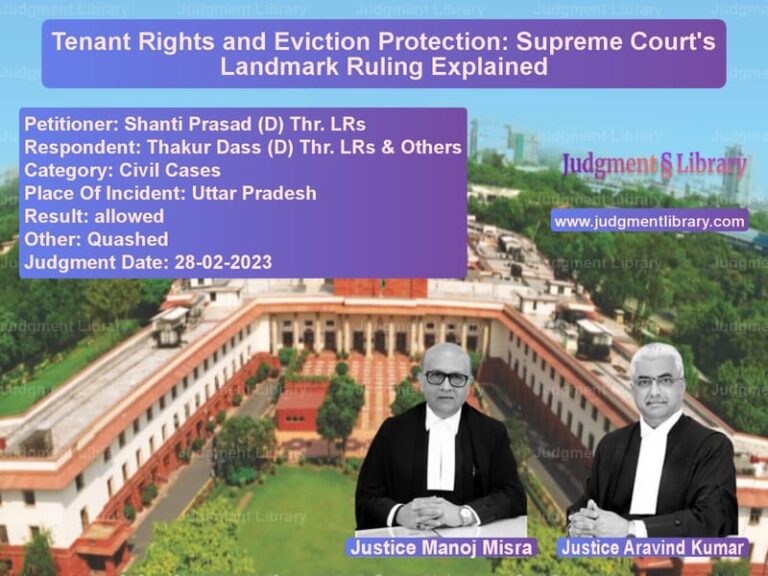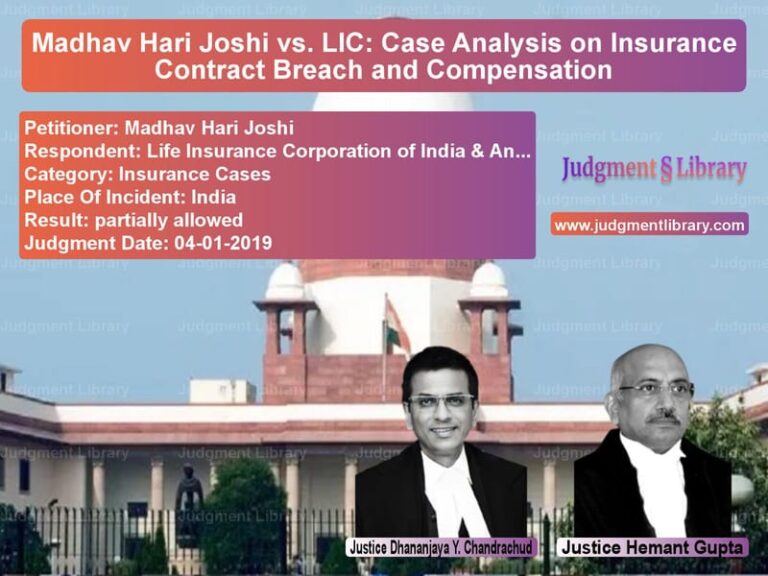Supreme Court Grants Divorce on Grounds of Irretrievable Breakdown After 16 Years Separation
In a landmark judgment that highlights the evolving approach to matrimonial disputes in India, the Supreme Court has granted divorce to a couple who had been living separately for nearly sixteen years. The case of Pradeep Bhardwaj versus Priya represents a significant development in family law jurisprudence, particularly concerning the concept of irretrievable breakdown of marriage as a ground for divorce.
The marriage between Pradeep Bhardwaj and Priya was solemnized on May 7, 2008, according to Hindu rites and ceremonies in Delhi. A male child was born from this union on March 25, 2009, who remained in the care and custody of the respondent-wife. However, the marital relationship began deteriorating soon after the wedding, and the parties started living separately from October 2009 – just about a year and a half after their marriage.
The appellant-husband initially filed for divorce under Section 13(1)(a) of the Hindu Marriage Act, 1955 before the Family Court in Tis Hazari, Delhi, seeking dissolution of marriage on the ground of cruelty. He alleged that the respondent used to assault and torture his ailing mother with an intention to grab her property. Further allegations included physical abuse against the appellant himself, claims of extra-marital relationship, and assault upon the appellant with the help of her brother.
The respondent-wife strongly contested these allegations, denying all claims of misconduct. She counter-argued that the appellant had failed to financially provide for her and their minor child. She stated that the appellant had abandoned her and their child since October 2009, and even during the brief period they lived together, she faced constant neglect and abuse at the hands of the appellant and his family members.
The Family Court, in its order dated November 23, 2017, dismissed the appellant’s divorce petition, holding that his case was “uninspiring and unworthy of acceptance.” The court found that the allegations of cruelty against the respondent remained unsubstantiated, as did the claim that she wanted transfer of property ownership. During the pendency of the divorce proceedings, the appellant had sought maintenance from the respondent under Section 24 of the Hindu Marriage Act, but this application was dismissed on March 12, 2012. Conversely, the respondent’s application for maintenance was granted, with the appellant directed to pay Rs. 4,500 per month to the respondent and their child, plus Rs. 5,000 towards litigation expenses.
Aggrieved by the Family Court’s decision, the appellant approached the Delhi High Court. Before the High Court, he strongly urged that “the limited ground on which he was seeking divorce was the irretrievable breakdown of marriage given the long period of separation between the parties and the constant feelings of animosity that the two parties harbour for each other.” The respondent continued to resist the grant of divorce.
The High Court, in its order dated February 26, 2019, affirmed the Family Court’s decision, holding that the appellant had failed to prove cruelty. The High Court made a significant observation that “granting a decree of divorce on the ground that cruelty stands blended with the irretrievable breakdown of marriage would be equivalent to rewarding the husband for leaving his wife and minor son.” The High Court not only dismissed the appeal but also imposed costs of Rs. 10,000 upon the respondent.
This led to the appeal before the Supreme Court, where the appellant presented several compelling arguments. He emphasized that “the parties separated just one year after their marriage and have remained apart ever since. The parties have been living separately for more than 16 years. There has been a complete cessation of cohabitation and consortium, rendering the marriage defunct for all practical and legal purposes.”
The appellant further argued that “continuing this relationship serves no purpose and would amount to a travesty of justice. That both the appellant and the respondent have already exhausted their youth, either in attempts to reconcile or in enduring the breakdown of their marital relationship.” He also pointed out that “there exists no possibility of reconciliation and the mediation also did not yield any positive result.”
A crucial development that strengthened the appellant’s case was the outcome of criminal proceedings initiated by the respondent under Sections 498A/406/34 of the Indian Penal Code in FIR No. 83 of 2011. The appellant and his family members were acquitted by the Trial Court on July 5, 2019, which demonstrated that the allegations of cruelty and dowry harassment against the appellant were false.
The appellant submitted that “in view of the above, the present case squarely falls within the scope of the principle of ‘irretrievable breakdown of marriage’ as a valid ground for granting divorce, as has been laid down by this Court in multiple judgments including Shilpa Sailesh v. Varun Sreenivasan, where this Court has recognized its power under Article 142 of the Constitution to dissolve marriages where the matrimonial relationship has irretrievably broken down.”
The respondent, while resisting the grant of divorce, maintained that “there are concurrent findings in favour of the respondent by both the Courts below and they should not be interfered with.” She argued that “the appellant has not been able to prove the allegations of cruelty against the respondent.”
In a particularly emotional submission, the respondent stated that “the appellant, in a most inconsiderate and inhumane manner, has denied the paternity of the child born out of the wedlock, and this makes it apparent that the appellant is not concerned about the well-being and social status of the child and the wife.” She contended that “the appellant cannot be permitted to take the benefit of his own wrong in ignoring his responsibilities as a husband and a father.”
Additionally, the respondent sought enhancement of the maintenance amount of Rs. 7,500 which had been awarded under Section 125 of the Code of Criminal Procedure.
The Supreme Court made several attempts at reconciliation, referring the parties to the Supreme Court Mediation Centre to explore the possibility of an amicable settlement. However, these mediation attempts failed, bringing the parties back to the courtroom.
The Supreme Court identified two main considerations that weighed heavily in its decision-making process. Firstly, that “the appellant-husband has been acquitted in the case of cruelty preferred by the respondent against him and his family members. Secondly, it is an admitted fact that the parties have been living separately since October 2009, i.e. almost for the past sixteen years.”
The Court articulated profound wisdom about the institution of marriage, stating that “it has been consistently held by this Court that the institution of marriage is rooted in dignity, mutual respect and shared companionship, and when these foundational aspects are irreparably lost, forcing a couple to remain legally bound serves no beneficial purpose.”
Quoting from its earlier judgment in Amutha v. A.R. Subramaniam, the Court emphasized that “the welfare and dignity of both the spouses must be prioritized, and that compelling a dead marriage to continue only perpetuates mental agony and societal burden.”
In its analysis of the specific case, the Court observed that “in the present case, it is apparent that due to complete detachment and the prolonged estrangement, there has been an irretrievable breakdown of the marital bond, which cannot be mended by any means. Moreover, both the parties have spent the prime years of their youth entangled in this marital discord, which has persisted for more than the last fifteen years.”
The Court made a powerful statement about the practical realities of continuing such marriages, noting that “it is as clear as a day that in the case at hand, the continuance of marriage shall only fuel animosity and litigation between the parties, which runs contrary to the ethos of matrimonial harmony envisioned by the law.”
The Court particularly emphasized the significance of the appellant’s acquittal in the cruelty case, stating that “this would ring true even more in the light of appellant’s and his family members’ acquittal in the cruelty case preferred by the respondent. It cannot be expected by the appellant to now continue in a marital bond with the respondent, a partner who had filed and fought a false case against her husband and in-laws.”
In its concluding remarks, the Court expressed its belief that “therefore, we are of the belief that it is in the best interest of both the parties and their minor child that they be allowed to lead their lives independently and peacefully, free from the shadow of prolonged and futile legal battles.”
The Court declared that “this Court finds it a fit case to exercise its power under Article 142 of the Constitution and grant the relief of divorce to the parties on the ground of irretrievable breakdown of marriage.”
While granting the divorce, the Court also addressed the financial aspects, considering that “the appellant is working as a clerk in a private firm and the respondent is a homemaker who is independently taking care of their minor son aged 16 years.” The Court found it “just and equitable to enhance the monthly maintenance to Rs. 15,000 per month in favour of the respondent and their minor son.”
Accordingly, the Supreme Court allowed the appeal and set aside the impugned order dated February 26, 2019. The marriage between the parties stands dissolved, with a decree of divorce granted by the Supreme Court in exercise of its power under Article 142 of the Constitution of India. The appellant was directed to pay composite monthly maintenance of Rs. 15,000 to the respondent and their child.
This judgment represents a significant step in Indian family law jurisprudence, acknowledging the practical realities of broken marriages and prioritizing the welfare and dignity of all parties involved, including children. The Court’s approach balances the need to preserve the sanctity of marriage with the recognition that forcing couples to remain in dead relationships serves no constructive purpose and often causes more harm than good.
Petitioner Name: Pradeep Bhardwaj.Respondent Name: Priya.Judgment By: Justice Vikram Nath, Justice Sandeep Mehta.Place Of Incident: Delhi.Judgment Date: 15-07-2025.Result: allowed.
Don’t miss out on the full details! Download the complete judgment in PDF format below and gain valuable insights instantly!
Download Judgment: pradeep-bhardwaj-vs-priya-supreme-court-of-india-judgment-dated-15-07-2025.pdf
Directly Download Judgment: Directly download this Judgment
See all petitions in Alimony and Maintenance
See all petitions in Child Custody
See all petitions in Domestic Violence
See all petitions in Mutual Consent Divorce
See all petitions in Dowry Cases
See all petitions in Judgment by Vikram Nath
See all petitions in Judgment by Sandeep Mehta
See all petitions in allowed
See all petitions in supreme court of India judgments July 2025
See all petitions in 2025 judgments
See all posts in Divorce Cases Category
See all allowed petitions in Divorce Cases Category
See all Dismissed petitions in Divorce Cases Category
See all partially allowed petitions in Divorce Cases Category

